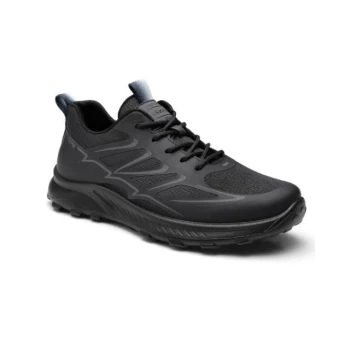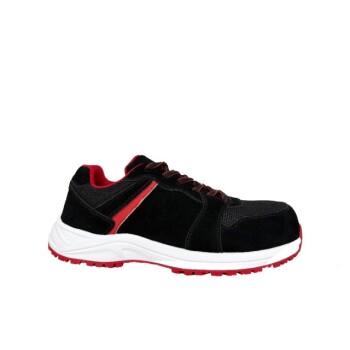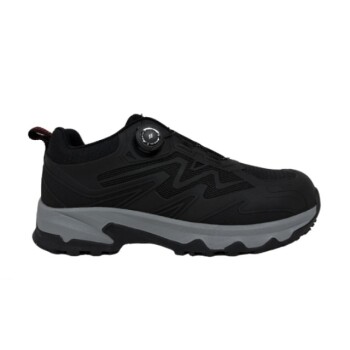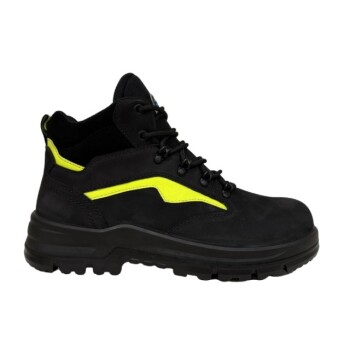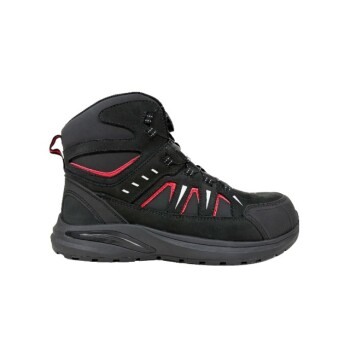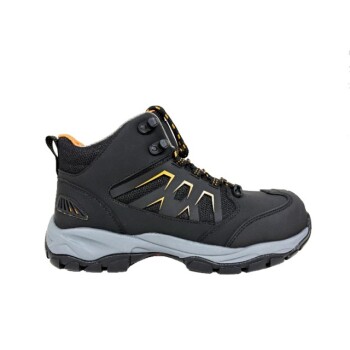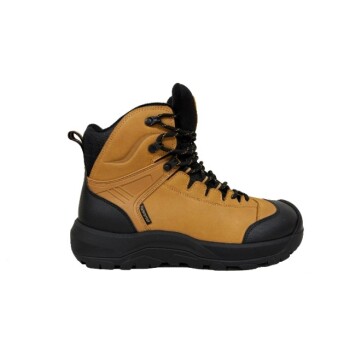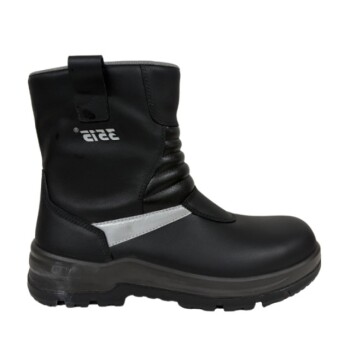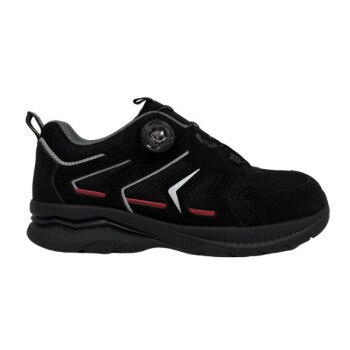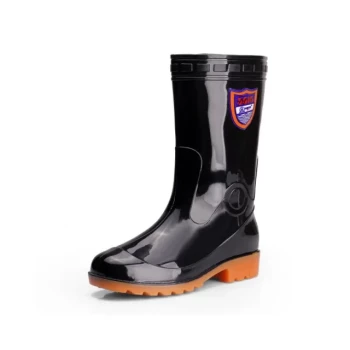The primary advantages of alloy safety toes are their significantly lighter weight and thinner profile compared to traditional steel. Made from materials like aluminum or titanium, they meet the same safety standards as steel but reduce boot weight by 30-50%. This creates a more comfortable boot with greater room in the toe box, reducing fatigue over long workdays.
Alloy toes offer a modern compromise, delivering premium comfort and a less bulky fit than steel. However, this comes at a higher cost and with specific limitations that make them unsuitable for certain work environments.
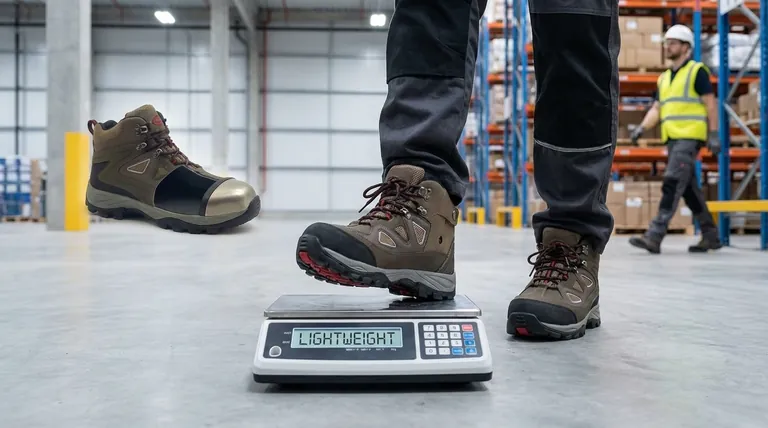
The Core Benefits of Alloy Toe Caps
Alloy toe caps are engineered to provide certified protection while prioritizing wearer comfort. Their distinct material properties create tangible benefits for professionals on their feet all day.
A Significant Reduction in Weight
The most notable benefit is a dramatic weight savings over steel. By being 30 to 50 percent lighter, alloy toes significantly reduce the energy you expend with every step.
This decrease in "swing weight" helps combat foot and leg fatigue, a critical factor for anyone working long shifts or covering large distances on a job site.
Increased Comfort and Toe Room
Because alloy metals are very strong for their mass, the protective toe cap can be made thinner than a steel cap.
This thinner profile creates a more spacious toe box. It provides more room for your toes to splay naturally, which enhances overall comfort and reduces the cramped feeling common in some safety footwear.
Performance in Cold Environments
While all metals conduct temperature, alloys like aluminum are often considered a better option than steel in extremely cold working environments.
They do not draw heat away from the foot as aggressively as a thick steel toe cap, offering a tangible comfort advantage in freezing conditions. However, for true thermal insulation, a non-metallic composite toe is superior.
Understanding the Trade-offs and Limitations
To make an informed decision, you must weigh the benefits of alloy toes against their specific drawbacks. No single safety toe material is perfect for every application.
The Cost Factor
The materials used in alloy toes are more expensive to source and manufacture than steel. This reality is reflected in the final product, making alloy toe boots more expensive than their steel toe counterparts.
Strength Relative to Steel
While all alloy toe boots must pass the same ASTM/ANSI safety standards for impact and compression, steel is inherently a stronger material. For roles with extreme risks of heavy impact, steel provides the absolute maximum level of protection.
Electrical Conductivity
This is a critical safety limitation. Alloy toes are metallic and conduct electricity. This makes them entirely unsuitable for electricians or anyone working in environments with live circuits or a risk of electrical shock.
Interaction with Metal Detectors
As a metallic component, alloy toes will set off metal detectors. This can be a significant inconvenience in high-security workplaces that require frequent screening, making non-metallic composite toes a better choice in those scenarios.
Making the Right Choice for Your Work
To select the best safety toe, align the material's properties with your daily work environment and priorities.
- If your primary focus is maximum comfort and reduced fatigue: Alloy toes are an excellent choice, provided you do not work in an electrically hazardous environment.
- If your primary focus is maximum impact protection and cost-effectiveness: Steel toes remain the industry standard and the most durable option.
- If your primary focus is working around electrical hazards or in extreme cold: Composite toes are the ideal solution as they are non-metallic and do not conduct electricity or temperature.
Understanding these key differences empowers you to choose personal protective equipment that enhances both your safety and your comfort on the job.
Summary Table:
| Feature | Alloy Toe | Steel Toe | Composite Toe |
|---|---|---|---|
| Weight | 30-50% Lighter | Standard | Lightweight |
| Profile | Thinner, More Toe Room | Bulkier | Thinner, Non-Metallic |
| Electrical Hazard | Conducts Electricity (Not Safe) | Conducts Electricity (Not Safe) | Non-Conductive (Safe) |
| Best For | Comfort, Reduced Fatigue | Maximum Protection, Cost-Effective | Electrical Work, Cold Environments |
Need the Perfect Safety Boots for Your Team?
As a large-scale manufacturer, 3515 produces a comprehensive range of safety footwear for distributors, brand owners, and bulk clients. Our production capabilities encompass all types of safety-toe boots, including alloy, steel, and composite toe options. We can help you source the ideal boots that balance protection, comfort, and cost for your specific work environment.
Contact 3515 today to discuss your bulk safety footwear needs and get a custom quote!
Visual Guide

Related Products
- Safety Footwear Wholesale Manufacturer for Custom OEM/ODM Production
- Custom OEM Training Shoes Wholesale Manufacturer Durable & Breathable
- Premium Suede Sport Safety Shoes for Wholesale & Bulk Orders
- Wholesale Safety Footwear Manufacturer for Bulk & Custom OEM Orders
- Custom Wholesale Leather Safety Boots Direct Factory Manufacturing
People Also Ask
- How do safety shoes contribute to cost savings for companies? A Strategic Investment in Risk and Cost Management
- What cultural and environmental considerations are tied to wearing shoes indoors? Balance Hygiene, Tradition, and Foot Health
- Is it normal to wear shoes in the house? A Guide to Hygiene, Comfort & Culture
- What are the cultural perspectives on wearing shoes in the house? A Guide to Home Etiquette & Hygiene
- Can heavy duty work boots be worn daily outside of work? Discover Durable, All-Day Comfort

